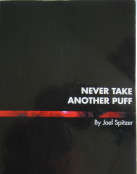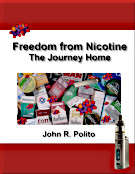
Smoking & how to quit while pregnant or breastfeeding
The Impact of Nicotine, Smoking and Tobacco
by John R. Polito, Nicotine Cessation Educator
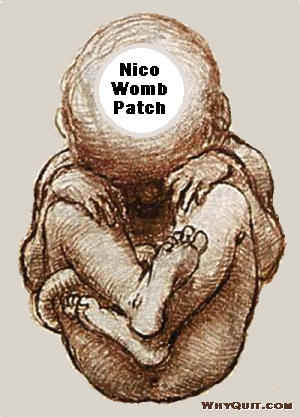
It is no longer a question of whether or not the unborn will be harmed by nicotine use during pregnancy, but the degree, number, types, noticeability and lifetime impact of the harms actually inflicted.
At a minimum, nicotine causes the developing fetal brain to grow millions of extra acetylcholine receptors in the cortex, striatum, and cerebellum regions ( 1995, 1999). At a minimum, it unnaturally regulates the pre-birth flow of more than 200 neurochemicals within the unborn's mind and body, including dopamine, serotonin and adrenaline.
But more important than scientific and Canadian government assertions that nicotine is more addictive than heroin or cocaine, or that unless the mother-to-be successfully arrests her dependency that the new-born's first real challenge in life will be enduring nicotine withdrawal and chemical detox alone, nicotine is not only a teratogen but very likely a neuro-teratogen inflicting lasting damage upon their nervous system ( 1991); ( 1998 - free full text study).
Nicotine is super toxic. In animal studies, drop for drop it has shown to be as lethal as strychnine or diamondback rattlesnake venom and deadlier than arsenic. Just 3-6 drops dripped on the skin (40-60mg) can kill a 160 pound human. The average smoker puts 1 mg of nicotine into their bloodstream with each cigarette. If the entire 1 mg was put on the skin of a 1 pound rat, the rat would die.
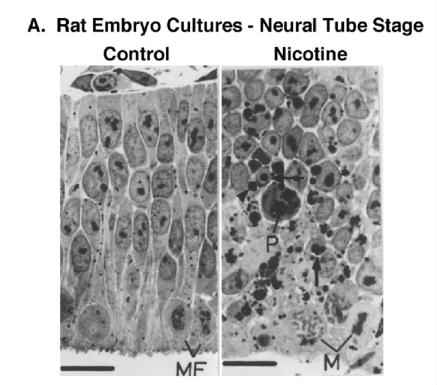 The problem isn't just smoked nicotine. On January 8, 2006, Professor Theodore Slotkin, a leading nicotine research toxicologist at Duke University Medical Center, stated:
The problem isn't just smoked nicotine. On January 8, 2006, Professor Theodore Slotkin, a leading nicotine research toxicologist at Duke University Medical Center, stated:
- "There is abundant evidence that the major problem for fetal development is exposure to nicotine rather than other components of cigarette smoke."
- "NRT, especially by transdermal patch, delivers more nicotine to the fetus than smoking does." According to Dr. Slotkin, a recent study found that the brains of fetal mice wound up with 2.5 times higher nicotine concentrations than found in the mother's blood when delivered via a slow continuous nicotine feed, as would be the case with the nicotine patch.
- "There are only two studies of the effectiveness of NRT in pregnancy and both show that it doesn't work. Counseling works better. Pregnant smokers who cannot quit spontaneously tend to smoke on top of the use of NRT, worsening the fetal effects."
The above slide is from a 2008 study by Professor Slotkin. It shows the cellular damage inflicted by nicotine in the neural tube stage in rats, the embryotic stage during which the brain first begins to unfold, a stage that starts in human embryos within 3 to 4 weeks of conception.
Although you have probably long dreamed of someday ending your brain's chemical addiction upon nicotine, the sudden news of pregnancy and deep concern for the growing life inside can make it seem like you're being forced to quit. It can leave the " junkie mind" feeling deprived of someday quitting on its own terms.
Instead of embracing the opportunity to live your own long held dream of breaking free, far too many mothers-to-be decide to temporarily stop for the baby. Sadly, roughly half of all who stop during pregnancy relapse to smoking nicotine within hours, days or weeks of giving birth (2013 survey of 1,024 OB-GYNs).
Instead of beginning a wonderful nicotine-free life together, these new babies have an actively feeding drug addict for a mother. Instead of being greeted by sweet smelling kisses, these babies bond their love with sensing the arrival of the nasty smells and odors of the over 4,000 chemicals that were just sucked into their mother's mouth and deposited upon her face, hands and clothing.
Forced to either breathe lingering clouds of toxins or watch mom depart at least hourly to tend, nurture and care for her addiction, when it comes to fresh air or love, these new babies live a constantly interrupted life.
Your selection of your primary quitting motivation, and keeping it adequately fueled, is critical to permanent nicotine dependency recovery. Quitting for your unborn child will create feelings of self-deprivation which will grow and all but assure nicotine relapse once you convince yourself that the greatest dangers have passed. By embracing recovery for you, and allowing your baby to inherit the fruits of mom's decision, you set the stage to permanently arrest your dependency.
Keep in mind that after giving birth most new mothers experience a brief period of minor sadness that may last up three weeks. What are the odds of you getting through this brief period without experiencing relapse if you failed to develop your own personal core recovery motivations and have no dreams or desires of your own to muster and rely upon?
 It is normal to feel like you are being asked to make a tremendous sacrifice by quitting. Why? Because nicotine addiction is a brain dopamine pathway brain wanting disorder, a mental illness and disease that compels us to equate ending nicotine use to starving ourselves to death or dying of thirst. Truth is, without food we die, without nicotine we thrive!
It is normal to feel like you are being asked to make a tremendous sacrifice by quitting. Why? Because nicotine addiction is a brain dopamine pathway brain wanting disorder, a mental illness and disease that compels us to equate ending nicotine use to starving ourselves to death or dying of thirst. Truth is, without food we die, without nicotine we thrive!
While normal to have falsely convinced yourself that you smoke because you like smoking, love smoking, to calm you when stressed (see pages 6-10), or for flavor or taste, truth is, these are not the reasons we smoked. We smoked because were were true drug addicts in every sense, because nicotine de-sensitized our brain, grew millions of extra a4b2 receptors and any attempt to stop produced a brief emotional train wreck while the brain worked around-the-clock to restore natural sensitivities.
Truth is, the real quitting took place on the day that nicotine took command of our mind's priorities teacher, our dopamine pathways. As hard as this is to believe right now, you're not giving up anything of value. Even the neuro-chemicals that nicotine controlled, each already belonged to you! Recovery is a journey home to an amazing sense of calm during crisis, to a clean, fresh and healthy you that your new baby will inherit, love and enjoy.
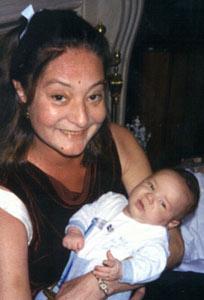
Nicotine's half-life inside both of you is about two hours. Within a maximum of 72 hours after last administering nicotine your blood serum and body will be 100% nicotine free and chemical withdrawal will have peaked in intensity and have started to gradually decline. But just one puff of nicotine and you will again face up to 72 hours of initial detox anxieties, a back to back energy draining feat which few have the endurance to complete. None of us are stronger than nicotine but then we don't need to be as it's only a chemical with an I.Q. of zero. Knowledge is power!
No crave episode triggered by encountering a conditioned nicotine feeding cue (times, places, activities and emotions during which you've created the subconscious expectation of smoking nicotine) will last longer than 3 minutes but be sure and look at a clock as time distortion during recovery is normal and minutes can seem like hours. The most craves encountered by the average quitter on the most challenging day of recovery is six (6) on day three. By day ten the average quitter is down to just 1.4 crave episodes per day.
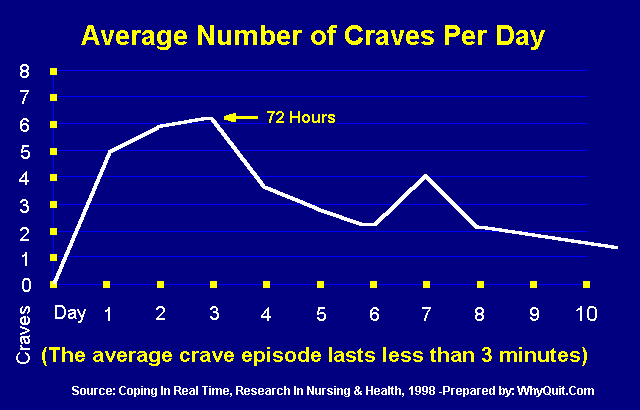
Can you handle 18 minutes of substantial anxiety (6 craves x 3 minutes)? Without a doubt! We all can. But what if you are not normal and have somehow established twice as may conditioned subconscious feeding cues as the average nicotine addict? Could you handle 12 crave episodes and up to 36 minutes of panic type anxiety on your most challenging day of your temporary period of re-adjustment called quitting? Absolutely!
Would you want your baby to eventually endure withdrawal alone as its welcome into the world? Click upon and read the following links guide about how to navigate the first 72 hours of recovery.
Once you realize that you can minimize many of the symptoms often experienced when quitting (such as wild blood sugar swings and caffeine overdose) and calm lots of needless fears (by understanding the emotional sense of loss, abandoning the concept of quitting forever and knowing the law of addiction ), you may find that recovery is far easier than you ever thought possible.
Knowledge and support are key to substantially enhancing our odds of reclaiming control of our mind, health and life expectancy. The gift of life can flow both ways if you'll only allow yourself to dream of being "you" again!
If you are looking for a website capable of guiding you in breaking nicotine's amazing grip upon your mind, health and life expectancy then you're in right place! If instead, you're searching for a website to reassure you that smoking or nicotine use is safe for you, your unborn baby, or your breastfeeding baby -- like some sites do -- then you probably need read no further. Those other sites are exactly right. Statistically, although substantially increased, the odds are still in your favor that neither smoking nor nicotine will kill your unborn baby but should death be the test? Fetal or infant nicotine addiction is not safe - in any form of delivery - and neither are the over 4,000 chemicals inhaled with each and every puff.
This link shows how each puff of nicotine gradually damages and impairs blood flow. If your baby is relying exclusively upon the contents of your blood to grow and properly develop, is it really any wonder that the below listed risks are being felt by babies whose blood is filled with large quantities of carbon monoxide and nicotine? There is always a price to pay. The only question is how much will it cost your child?
If you should find WhyQuit, Joel's Library, and/or Turkeyville helpful in breaking nicotine's grip, please be sure and tell your OB/GYN or family physician as they are likely searching desperately for effective recovery tools to help other smoking patients.
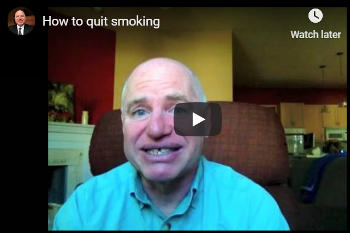
Have you read our stop smoking books?
Read both and allow knowledge and understanding
to destroy needless fear driven anxieties!
Known Pregnancy Smoking Risk Factors
Women who smoke during pregnancy are subjecting their pregnancy and unborn baby to increased risk of ...
- Autism - 07/02
- Asthma - 01/04
- Clubfoot - 08/02
- Wheezing - 12/03
- Birth defects - 11/05
- Hyperactivity - 04/04
- Ear infections - 02/02
- A shorter child - 07/06
- Premature birth - 02/02
- Low-birthweight - 01/04
- Hearing damage - 07/06
- Fewer brain cells - 08/04
- Immunodeficiency - 06/05
- Middle ear disease - 08/99
- Ectopic pregnancy - 02/02
- Inferior school work - 06/08
- Tourette's syndrome - 06/06
- Colic or excessive crying - 08/01
- Increased infant irritability - 05/09
- Nicotine withdrawal at birth - 06/03
- Obesity and type II diabetes - 12/05
- Reduced umbilical blood flow - 02/09
- A doubled risk of stillbirth - 04/04 10/09
- Deficits in visuospatial memory - 12/05
- Diminished brain and head growth - 02/07
- Abnormal lung development - 12/12 01/02 03/11
- 40% higher chance of infant mortality - 12/03
- 2.7 times increased odds of infant infections - 01/08
- Sudden infant death syndrome (SIDS) - 02/14 05/13
- An increased rise in a child's total cholesterol - 01/08
- Optic nerve hypoplasia and visual impairment - 06/02
- Placental abruption and placenta previa - 10/01 11/96
- Oral clefts in the lip and/or palate - 07/04 01/02 02/00
- Alterations in medial temporal lobe brain function - 12/05
- Narrowing of your child's largest artery, their aorta - 08/08
- Smaller baby brain waves and slower speech response - 04/07
- Diminished impulse control, lower accuracy, delayed learning - 04/11
- Increased lifetime testosterone levels for your unborn daughter - 06/03
- Increased risk of juvenile rheumatoid arthritis for your daughter - 01/05
- Diminished future fertility (fewer eggs) for your unborn daughter - 11/07
- 2.2 times greater odds of your child developing eye retina cancer - 07/09
- Significantly smaller brain size in frontal lobe & cerebellar regions - 10/09
- 53% greater odds of your child being nicotine dependent at age 21 - 08/09
- 160% increase in the risk of your child having behavioral problems - 07/98
- Diminished sperm count/smaller testies for your unborn son - 01/04 05/03
- Brain damage to serotonin neurons and possible lifetime depression 09/01
- Average of $704 in extra neonatal costs per smoking mother - 10/04 04/02
- Average childhood inpatient hospital costs of $900 over first 5 years - 03/05
- 344% greater odds of attention-deficit hyperactivity (ADHD) - 02/14 11/06 07/04 07/03
Known Breastfeeding Risk Factors
The number of web sites and articles that advise smoking mothers that the benefits of breastfeeding outweigh the risks posed by smoking is shocking. Most ignore the baby as a person who is subject to all other recent studies relating to nicotine addiction, nicotine's harms, smoking's other risks, including the risks posed by second-hand smoke.
For example, if a mother abstained from smoking while pregnant, how long will it take to hook her new baby on nicotine if she returns to smoking while breastfeeding? A recent study presents strong evidence that it may only take a few cigarettes a day for a few weeks to addict a full grown teenager. What evidence do we have to suggest that the outcome is any different for a small baby?
Included in the risks below are risks identified in other recent studies with at least one link to articles discussing each risk. Review each and decide for yourself whether or not they'd have application to a newborn. For example, if nicotine is believed to cause chronic depression, brain damage and learning impairment in new teen smokers, what evidence is there to suggest that feeding your baby nicotine via your milk wouldn't do the same? Although extremely difficult to develop any medical study to measure depression or intelligence in newborns, does that mean we should ignore such studies when it comes to breastfeeding?
Women who smoke while breastfeeding may subject their baby to the risk of ...
- Addiction - 05/02
- Chronic Depression - 02/04
- Middle ear infections - 02/02
- Less breast milk - 12/91 12/92
- Destruction of brain cells - 05/02
- Colic or excessive crying - 03/89
- Circulatory damage - 07/01 07/01
- Not being able to initiate breast feeding - 07/02
- Sudden infant death syndrome (SIDS) - 01/05 11/97
- Not wanting to initiate breast feeding due to smoking - 1999
- Growth of brain neurons to process nicotine - 05/02 03/02 11/95
- A reduction in the breast's ability to pass key nutrients to the infant - 07/04
Specific Breastfeeding Risk Reduction Findings
Save or share this article with others
Knowledge is a Quitting Method

